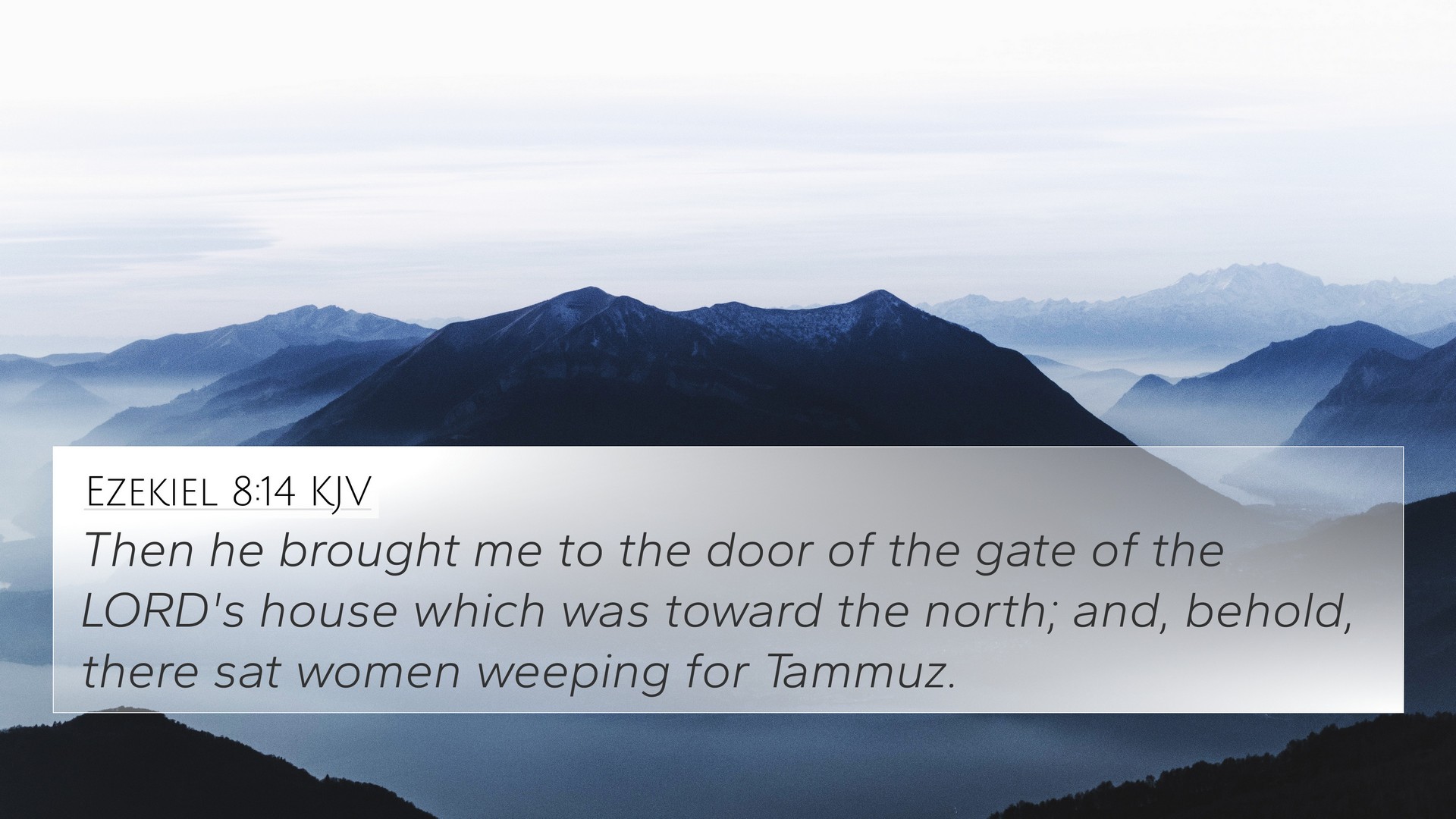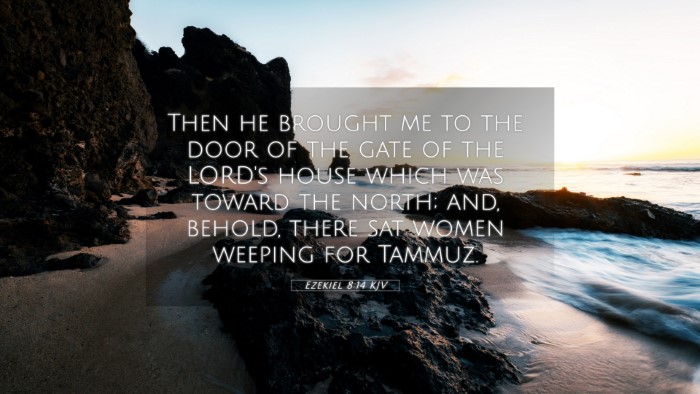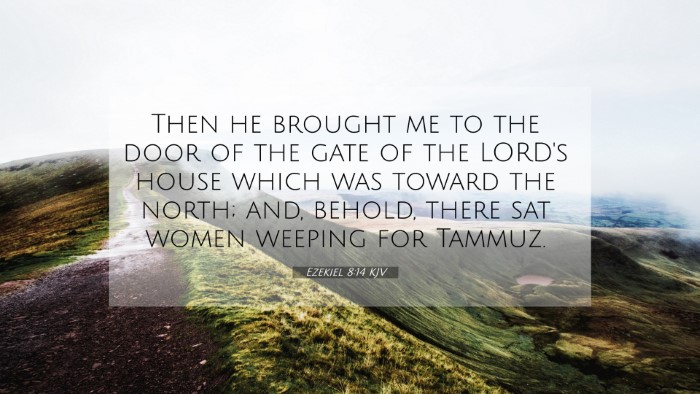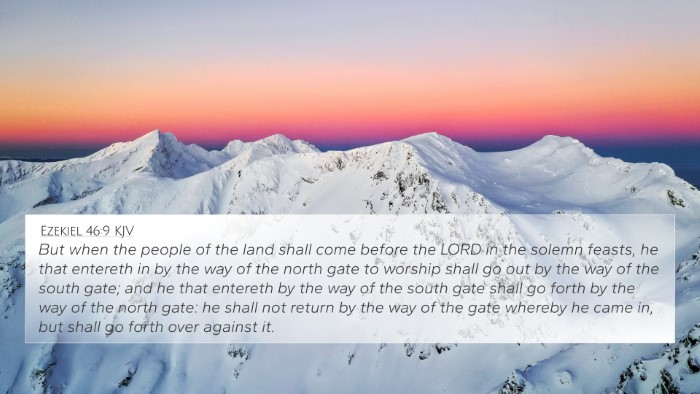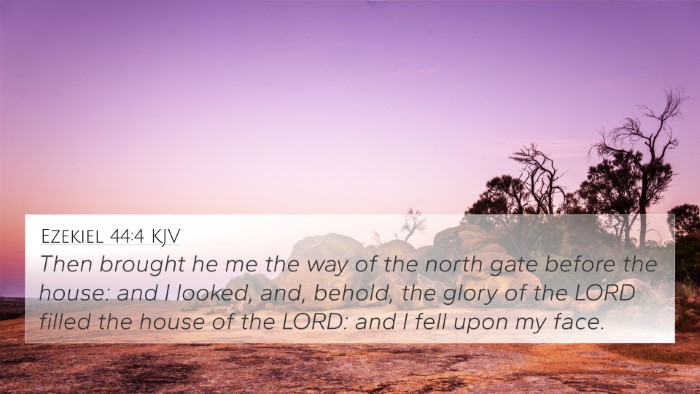Ezekiel 8:14 - Summary and Meaning
Ezekiel 8:14 describes a revelation given to the prophet Ezekiel, where he sees a vision that reveals the apostasy and idolatry of the people of Israel. In this vision, Ezekiel is taken to the entrance of the northern gate of the Lord's temple, where he witnesses women weeping for Tammuz. Tammuz was a fertility deity worshiped by many in the ancient Near East, highlighting the spiritual decline of God's people who turned to foreign gods.
Commentary Insights
The commentaries from Matthew Henry, Albert Barnes, and Adam Clarke offer rich insights into this verse:
-
Matthew Henry:
Henry emphasizes the gravity of idolatry and its implications for the covenant people. He points out that the act of weeping for Tammuz signifies not just personal grief but a significant turning away from true worship, reflecting a deep-seated disloyalty to God.
-
Albert Barnes:
Barnes highlights the cultural context of this weeping ritual, noting that Tammuz represented a life force, and the mourning rites often coincided with the agricultural cycles. Barnes argues that this practice was a stark contrast to the monotheistic worship of Yahweh and illustrates the dangers of syncretism within worship practices.
-
Adam Clarke:
Clarke indicates that the act of mourning for Tammuz reflects a misguided hope in fertility and renewal rather than reliance on God's provision. He further connects this practice to Israel's overall spiritual decay, emphasizing the dire situation in which the nation found itself due to idolatrous practices.
Cross-References for Ezekiel 8:14
Ezekiel 8:14 has several verses that resonate with its themes of idolatry and spiritual neglect:
- Jeremiah 44:17-19: Highlights the continuation of idolatrous practices among the people despite prophecies of judgment.
- Ezekiel 14:3: Discusses Israel’s idols in their hearts and the consequences of idolatry.
- Isaiah 57:13: Talks about the futility of turning to idols and the judgment that follows.
- Hosea 4:12: Mentions how people consult wooden idols and diviners, highlighting spiritual blindness.
- 2 Kings 23:5: Describes King Josiah's reforms against idol worship, emphasizing the historical backdrop of Ezekiel's prophecies.
- 1 Corinthians 10:20-21: Stresses that the worship of idols is a direct affront to God and His worship.
- Matthew 15:8-9: Jesus quotes Isaiah, implying that honoring God with lips while hearts are far is a recurring issue.
Connections and Themes
The themes presented in Ezekiel 8:14 resonate with broader Biblical narratives concerning idolatry, themes of repentance, and the call to return to true worship. The connections between these verses reveal an inter-Biblical dialogue on the dangers of straying from faithfulness to God:
-
Thematic Bible Verse Connections:
The juxtaposition of Israel's apostasy against God's covenant loyalty provokes a significant reflection on faithfulness and idolatry that echoes from the Old Testament through to the New Testament.
-
Comparative Bible Verse Analysis:
Analyzing the actions of the Israelites during Ezekiel's time and the exhortations found in the New Testament presents a comprehensive view of God's continuous call to His people to turn away from all forms of idolatry.
How to Use Bible Cross-References
For deeper study, one can utilize tools for Bible cross-referencing. Methods could include:
- Bible Concordance: A useful resource for finding verses related to specific themes or keywords.
- Bible Cross-Reference Guide: Guiding believers through interconnected themes and verses.
- Cross-Reference Bible Study: Engaging with multiple passages to gain holistic understanding.
- Bible Reference Resources: Understanding the narrative and thematic structures across scripture.
User Intent and Exploration
Those seeking to understand Ezekiel 8:14 may wander into questions like:
- What other verses are related to idolatry and turning away from God?
- Find cross-references for Ezekiel 8:14 to comprehend its meaning better.
- How do the principles in Ezekiel connect with New Testament teachings on faith?
Conclusion
In conclusion, Ezekiel 8:14 serves as a sober reminder of the constant temptation to turn away from God and seek fulfillment in earthly idols. The insights drawn from various public domain commentaries bring forth a unified call to examine our hearts and worship practices, ensuring fidelity to the true God amidst a world filled with distractions.
